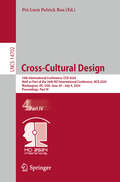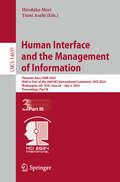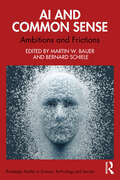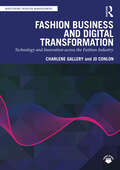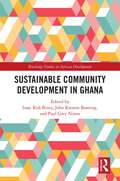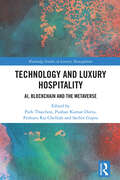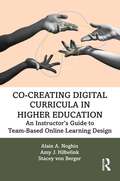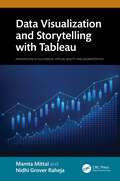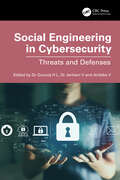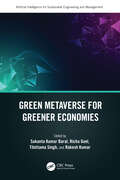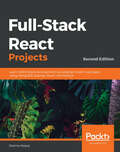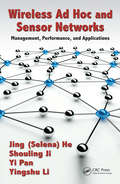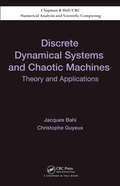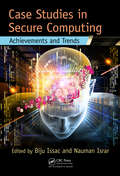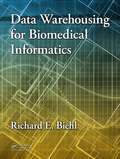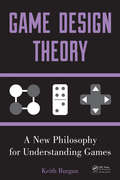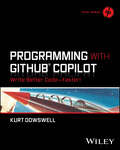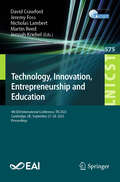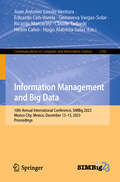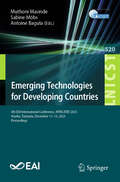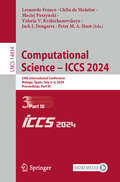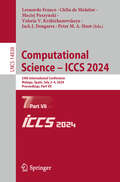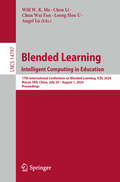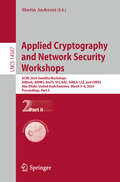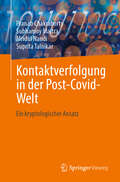- Table View
- List View
Cross-Cultural Design: 16th International Conference, CCD 2024, Held as Part of the 26th HCI International Conference, HCII 2024, Washington, DC, USA, June 29 – July 4, 2024, Proceedings, Part IV (Lecture Notes in Computer Science #14702)
by Pei-Luen Patrick RauThis four-volume set LNCS 14699-14702 constitutes the thoroughly refereed proceedings of the 16th International Conference on Cross-Cultural Design 2024 (CCD 2024), held as part of the 26th International Conference on Human-Computer Interaction, HCI International 2024 (HCII 2024), was held as a hybrid event in Washington DC, USA, during June/July 2024. The total of 1271 papers and 309 posters included in the HCII 2023 proceedings was carefully reviewed and selected from 5108 submissions. The CCD 2024 conference focuses a broad range of theoretical and applied issues related to Cross-Cultural Design and its applications, and much more.
Human Interface and the Management of Information: Thematic Area, HIMI 2024, Held as Part of the 26th HCI International Conference, HCII 2024, Washington, DC, USA, June 29–July 4, 2024, Proceedings, Part III (Lecture Notes in Computer Science #14691)
by Hirohiko Mori Yumi AsahiThis three-volume set LNCS 14789-14791 constitutes the thoroughly refereed proceedings of the thematic area Human Interface and the Management of Information, HIMI 2024, held as part of the 26th International Conference on Human-Computer Interaction, HCI International 2024 (HCII 2024), was held as a hybrid event in Washington DC, USA, during June/July 2024. The total of 1271 papers and 309 posters included in the HCII 2023 proceedings was carefully reviewed and selected from 5108 submissions. The HIMI conference addressed approaches and objectives of information and data design, retrieval, presentation and visualization, management, and evaluation in human computer interaction in a variety of application domains, such as, for example, learning, work, decision, collaboration, medical support, and service engineering, and much more.
AI and Common Sense: Ambitions and Frictions (Routledge Studies in Science, Technology and Society)
by Martin W. Bauer and Bernard SchieleCommon sense is the endless frontier in the development of artificial intelligence, but what exactly is common sense, can we replicate it in algorithmic form, and if we can – should we?Bauer, Schiele and their contributors from a range of disciplines analyse the nature of common sense, and the consequent challenges of incorporating into artificial intelligence models. They look at different ways we might understand common sense and which of these ways are simulated within computer algorithms. These include sensory integration, self-evident truths, rhetorical common places, and mutuality and intentionality of actors within a moral community. How far are these possible features within and of machines? Approaching from a range of perspectives including Sociology, Political Science, Media and Culture, Psychology and Computer Science, the contributors lay out key questions, practical challenges and "common sense" concerns underlying the incorporation of common sense within machine learning algorithms for simulating intelligence, socialising robots, self-driving vehicles, personnel selection, reading, automatic text analysis, and text production.A valuable resource for students and scholars of Science–Technology–Society Studies, Sociologists, Psychologists, Media and Culture Studies, human–computer interaction with an interest in the post-human, and programmers tackling the contextual questions of machine learning.
Fashion Business and Digital Transformation: Technology and Innovation across the Fashion Industry (Mastering Fashion Management)
by Charlene Gallery Jo ConlonFashion Business and Digital Transformation provides a practical and holistic overview of the fashion industry and the key technologies impacting the fashion supply chain. It covers product design and development, production, sales and customer experiences in physical, online and virtual environments. The key technologies impacting the ecosystem are explored, including artificial intelligence, virtual reality, augmented reality, digital fashion design, NFTs, 3D textiles, and blockchain. Strategic concepts such as ‘retail-tainment’, ‘phygital’, gamification and e-commerce, are analysed, alongside the effect of these key strategies for both the retailer and the customer.Theoretical foundations are supported by extensive use of examples, interviews and case studies drawn from a wide range of global fashion disrupters and cutting-edge brands. Engaging activities, exercises, and technical step-by-step guides are incorporated throughout, which will both consolidate how technology is driving change in the industry, but also equip the reader with the key skills and digital literacy capabilities required by future practitioners. Online resources include chapter-by-chapter PowerPoint slides, a test bank and links to further resources.This examination of the digital transformation of the fashion industry will be essential reading for advanced undergraduate and postgraduate students of Fashion Management, Fashion Business and Fashion Technology.
Sustainable Community Development in Ghana (Routledge Studies in African Development)
by John Kwame Boateng Isaac Kofi Biney Paul Gary NixonThis book explores sustainable community development in Ghana post-COVID-19, highlighting examples of how individuals facing extreme challenges have adapted to their changing circumstances.Through the voices of African researchers, it explores the different responses that local, subnational, and national stakeholders and communities initiated to preserve the gains made in achieving the Sustainable Development Goals in Ghana during the global pandemic. This collection considers how policy makers are tackling the pressing issues of sustainability, climate change and its effects on Africa and Ghana in particular, and multi-stakeholder policy responses to building communities in a post-COVID-19 world. The case studies show how communities are interacting to ensure sustainable community development and learning in the Global South, and the role that education and learning, both formal and informal, play in strengthening livelihoods, choices, and opportunities in African communities.An assessment of multi-stakeholder policy responses to building communities in Ghana, this book will be of interest to scholars and students in the field of Education, Education Management, Sociology, Economics, and African Studies. It will also be of interest to policy makers and practitioners engaged in community development programmes and activities and the development of associated policies.
Technology and Luxury Hospitality: AI, Blockchain and the Metaverse (Routledge Studies in Luxury Management)
by Pethuru Raj Chelliah Park Thaichon Sachin Gupta Pushan Kumar DuttaThe integration of pioneering information and communication technologies has transformed the hospitality sector. This groundbreaking book delves into the transformative power of cutting-edge technologies in the world of high-end travel and accommodation. As the digital revolution continues to reshape our lives, this book offers an exclusive look at how the hospitality industry is adapting and evolving to cater to the sophisticated tastes of the modern, tech-savvy traveller.In this eye-opening exploration, readers will be taken on a journey through the latest innovations in artificial intelligence, blockchain, and the metaverse as they intersect with the world of luxury hospitality. From AI-driven concierge services and smart hotel rooms that cater to guests' every whim to the democratization of luxury experiences through blockchain-based loyalty programmes and the rise of virtual reality travel, this book reveals the extraordinary possibilities that lie ahead for the discerning traveller.With insights from international experts, this edited collection provides a comprehensive and engaging overview of the current and future trends shaping the industry and will be valuable to scholars and postgraduate researchers across the hospitality sector, innovation, and luxury management.
Co-Creating Digital Curricula in Higher Education: An Instructor’s Guide to Team-Based Online Learning Design
by Alain A. Noghiu Amy J. Hilbelink Stacey von BergerCo-Creating Digital Curricula in Higher Education is a step-by-step guide to the collaborative design of online and blended curricula in higher education using systematic yet flexible frameworks. While instructors charged with developing and delivering curricula in the remote era may lack formal credentials in learning design, technology management, and institutional leadership, they nonetheless have numerous opportunities to partner with stakeholders who do. This practical, actionable workbook empowers and upskills teaching faculty to partner with their fellow professionals—instructional designers, lead administrators, librarians, and other student support personnel—in co-creative design endeavors that foster outstanding curricula and engaged, successful learners. This holistic, team-oriented approach, intended to ensure curricular cohesion within and between courses, certificates, and programs, is supported by workflows, checklists, workshop agendas, and other field-tested resources.
Data Visualization and Storytelling with Tableau (Innovations in Multimedia, Virtual Reality and Augmentation)
by Mamta Mittal Nidhi Grover RahejaTableau, one of the most widely used visualization tools, helps in illustrating the ideas of data visualization and storytelling. Through Tableau’s Data Visualization and Storytelling feature, aspiring data scientists and analysts can develop their visual analytics skills and use them in both academic and business contexts.Data Visualization and Storytelling with Tableau enables budding data analysts and data scientists to develop and sharpen their skills in the field of visual analytics and apply them in business scenarios as well as in academic context. This book approaches the Data Visualization workflow from a practical point of view, emphasizing the steps involved and the outcomes attained. A major focus of this book is the application and deployment of real-time case studies. Later chapters in this book provide comprehensive coverage for advanced topics such as data storytelling, data insights, color selection in graphs, publishing in tableau public, and misleading visualizations. Thus, this book emphasizes the need to visually examine and evaluate data through stories and interactive dashboards that are made up of appropriate graphs and charts. The case studies covered in this book are a natural extension of the visualization topics that are covered in each chapter. The intention is to empower readers to generate various dashboards, stories, graphs, charts, and maps to visualize and analyze data and support decision-making in business. Advanced charts that are pertinent to project management operations are also thoroughly explored, including comparison charts, distribution charts, composition charts, and maps. All these concepts will lay a solid foundation for data visualization applications in the minds of readers.This book is meant for data analysts, computer scientists/engineers, and industry professionals who are interested in creating different types of visualization graphs for a given data problem and drawing interesting insights from the plotted trends in order to make better business decisions in the future. Features: Introduces the world of Business Intelligence to readers through visualizations in Tableau. Discusses the need and relevance of each business graph with the help of a corresponding real-time case study. Explores the art of picking a suitable graph with an appropriate color scheme for a given scenario. Establishes the process of gaining relevant insights from the analysis of visualizations created. Provides guidance in creating innovative dashboards and driving the readers through the process of innovative storytelling with data in Tableau. Implements the concept of Exploratory Data Analysis (EDA) in Tableau.
Social Engineering in Cybersecurity: Threats and Defenses
by Dr Gururaj H L Dr Janhavi V Ambika VIn today’s digitally interconnected world, the threat landscape has evolved to include not just sophisticated technical exploits but also the art of human manipulation. Social engineering attacks have emerged as a formidable and often underestimated threat to information security. The primary aim of this textbook is to provide a comprehensive and in-depth exploration of social engineering attacks. The book seeks to equip cybersecurity professionals, IT practitioners, students, and anyone concerned with information security with the knowledge and tools needed to recognize, prevent, and mitigate the risks posed by social engineering. The scope of this textbook is broad and multifaceted. It covers a wide range of social engineering attack vectors, including phishing, vishing, pretexting, baiting, tailgating, impersonation, and more. Each attack vector is dissected, with detailed explanations of how they work, real-world examples, and countermeasures. Key Features • Comprehensive Coverage: Thorough exploration of various social engineering attack vectors, including phishing, vishing, pretexting, baiting, quid pro quo, tailgating, impersonation, and more. • Psychological Insights: In-depth examination of the psychological principles and cognitive biases that underlie social engineering tactics. • Real-World Case Studies: Analysis of real-world examples and high-profile social engineering incidents to illustrate concepts and techniques.• Prevention and Mitigation: Practical guidance on how to recognize, prevent, and mitigate social engineering attacks, including security best practices. • Ethical Considerations: Discussion of ethical dilemmas and legal aspects related to social engineering that emphasizes responsible use of knowledge. This comprehensive textbook on social engineering attacks provides a deep and practical exploration of this increasingly prevalent threat in cybersecurity. It covers a wide array of attack vectors, including phishing, vishing, pretexting, and more, offering readers an in-depth understanding of how these attacks work. The book delves into the psychology behind social engineering and examines the cognitive biases and emotional triggers that make individuals susceptible. Real-world case studies illustrate concepts and techniques while practical guidance equips readers with the knowledge to recognize, prevent, and mitigate social engineering threats.
Green Metaverse for Greener Economies (Artificial Intelligence for Sustainable Engineering and Management)
by Rakesh Kumar Richa Goel Tilottama Singh Sukanta Kumar BaralThis book reviews Metaverse, the possibilities and difficulties of sustainable development, and policy suggestions, especially within the context of the 2030 Agenda.Green Metaverse for Greener Economies examines how the metaverse holds the potential to significantly reduce carbon emissions, whether through the replacement of physical goods with digital ones, the substitution of in-person interactions with virtual ones, or the creation of digital twins that will aid in the optimization of the physical world, from the planet to specific individuals thereby leading to sustainable world. The book includes a number of case studies, exploratory studies utilizing quantitative analysis, scientific studies, and qualitative studies to demonstrate how metaverse leading innovation and technology aids to achieve business sustainability in the emerging economies while also having an impact on the global economy (SDGs).This book will be useful for engineers, managers, and policy makers working on improving sustainability and reducing their carbon emissions through more energy-efficient processes.Features: Shares essential policy tools on innovation and technology for sustainable computing. Reviews metaverse, the possibilities and difficulties of sustainable development, and policy suggestions, especially within the context of the 2030 Agenda. Explores green technology concept, difficulties, and challenges ahead. Includes several case studies, exploratory studies utilizing quantitative analysis, scientific studies, and qualitative studies to demonstrate how metaverse leading innovation. Explores innovative technology in sustainable society like digital transformational, metaverse in business management, and innovative technology in healthcare.
Full-Stack React Projects: Learn MERN stack development by building modern web apps using MongoDB, Express, React, and Node.js
by Shama HoqueA practical, project-based guide to full-stack JavaScript web development combining the power of React with industry-tested server-side technologiesKey FeaturesBuild your career as a full-stack developer with this practical guideUnderstand how the different aspects of a MERN application come together through a series of practical projectsMaster the MERN stack by building robust social media, E-commerce store, and web-based VR game appsBook DescriptionFacebook's React combined with industry-tested, server-side technologies, such as Node, Express, and MongoDB, enables you to develop and deploy robust real-world full-stack web apps. This updated second edition focuses on the latest versions and conventions of the technologies in this stack, along with their new features such as Hooks in React and async/await in JavaScript. The book also explores advanced topics such as implementing real-time bidding, a web-based classroom app, and data visualization in an expense tracking app. Full-Stack React Projects will take you through the process of preparing the development environment for MERN stack-based web development, creating a basic skeleton app, and extending it to build six different web apps. You’ll build apps for social media, classrooms, media streaming, online marketplaces with real-time bidding, and web-based games with virtual reality features. Throughout the book, you’ll learn how MERN stack web development works, extend its capabilities for complex features, and gain actionable insights into creating MERN-based apps, along with exploring industry best practices to meet the ever-increasing demands of the real world. By the end of this React book, you’ll be able to build production-ready MERN full-stack apps using advanced tools and techniques in modern web development.What you will learnExtend a basic MERN-based application to build a variety of applicationsAdd real-time communication capabilities with Socket.IOImplement data visualization features for React applications using VictoryDevelop media streaming applications using MongoDB GridFSImprove SEO for your MERN apps by implementing server-side rendering with dataImplement user authentication and authorization using JSON web tokensSet up and use React 360 to develop user interfaces with VR capabilitiesMake your MERN stack applications reliable and scalable with industry best practicesWho this book is forThis is one of the most useful web development books for JavaScript developers who may have worked with React but have minimal experience in full-stack development with Node, Express, and MongoDB.
Wireless Ad Hoc and Sensor Networks: Management, Performance, and Applications
by Yi Pan Yingshu Li Jing (Selina) He Mr. Shouling JiAlthough wireless sensor networks (WSNs) have been employed across a range of applications, there are few books available that cover the required algorithms, performance analysis, and applications of network management techniques in WSNs. Filling this need, this book presents new network management techniques that can address many of the shortcomings of traditional techniques. It summarizes traditional and classical network management techniques as well as state-of-the-art methods.
Discrete Dynamical Systems and Chaotic Machines: Theory and Applications (Chapman & Hall/CRC Numerical Analysis and Scientific Computing Series #20)
by Christophe Guyeux Jacques BahiUntil the authors' recent research, the practical implementation of the mathematical theory of chaos on finite machines raised several issues. This self-contained book shows how to make finite machines, such as computers, neural networks, and wireless sensor networks, work chaotically as defined in a rigorous mathematical framework. Taking into account that these machines must interact in the real world, the authors share their research results on the behaviors of discrete dynamical systems and their use in computer science.
Case Studies in Secure Computing: Achievements and Trends
by Biju Issac Nauman IsrarThis book gathers the latest research with case studies in secure computing from many researchers. It compiles the recent work and findings through case studies, where the growing security attacks and countermeasures in the mobile and networking world has been explained, along with other pertinent security issues with the technology of the application itself. It discusses the challenges faced and solutions proposed by different researchers in this area.
Data Warehousing for Biomedical Informatics
by Richard E. BiehlData Warehousing for Biomedical Informatics is a step-by-step how-to guide for designing and building an enterprise-wide data warehouse across a biomedical or healthcare institution, using a four-iteration lifecycle and standardized design pattern. It enables you to quickly implement a fully-scalable generic data architecture that supports your organization's clinical, operational, administrative, financial, and research data. By following the guidelines in this book, you will be able to successfully progress through the Alpha, Beta, and Gamma versions, plus fully implement your first production release in about a year.
Game Design Theory: A New Philosophy for Understanding Games
by Keith BurgunDespite the proliferation of video games in the twenty-first century, the theory of game design is largely underdeveloped, leaving designers on their own to understand what games really are. Helping you produce better games, Game Design Theory: A New Philosophy for Understanding Games presents a bold new path for analyzing and designing games.
Programming with GitHub Copilot: Write Better Code--Faster! (Tech Today)
by Kurt DowswellAccelerate your programming with the most popular AI coding tool on the market: GitHub Copilot In Programming with GitHub Copilot: Write Better Code — Faster, veteran software developer and GitHub community hero Kurt Dowswell delivers an insightful and hands-on exploration of GitHub's powerful, new AI coding assistant, Copilot. In the book, you'll discover how to use the tool's capabilities to push the boundaries of what you thought was possible in programming. Even if you've used autocomplete tools—like VS Code's TabNine extension—before, you'll be floored by GitHub Copilot's potential to transform the way you code. You'll learn how to install, configure, and use the software, from employing it's most common and widely used features to deploying business and enterprise functionality. You'll even discover how to fix runtime and compilation bugs and write unit, integration, and end-to-end tests. You'll also find: Prompt strategies to get GitHub Copilot to help you brainstorm new code solutions What the future looks like for AI-assisted coding, including discussions of issues like code licensing and ethics Directions for chatting with Copilot, including common commands and prompts to help you guide the conversation to where you want it to go Perfect for practicing programmers, developers, and software engineers, Programming with GitHub Copilot is also an essential resource for coders and other IT practitioners-in-training who want to expand their knowledge and improve the scope and depth of their programming skillsets.
Technology, Innovation, Entrepreneurship and Education: 4th EAI International Conference, TIE 2023, Cambridge, UK, September 27-28, 2023, Proceedings (Lecture Notes of the Institute for Computer Sciences, Social Informatics and Telecommunications Engineering #575)
by David Crawford Martin Reed Nicholas Lambert Jeremy Foss Jennah KriebelThis book constitutes the refereed proceedings of the 4th International Conference on Technology, Innovation, Entrepreneurship and Education, TIE 2023, held in Cambridge, UK, in September 2023. The 17 full papers were carefully selected from 44 submissions and cover four areas: international school projects; technology in education; technology for content creation and future content delivery.
Information Management and Big Data: 10th Annual International Conference, SIMBig 2023, Mexico City, Mexico, December 13–15, 2023, Proceedings (Communications in Computer and Information Science #2142)
by Juan Antonio Lossio-Ventura Hugo Alatrista-Salas Hiram Calvo Genoveva Vargas-Solar Eduardo Ceh-Varela Ricardo Marcacini Claude TadonkiThis book constitutes the refereed proceedings of the 10th Annual International Conference on Information Management and Big Data, SIMBig 2023, held in Mexico City, Mexico, during December 13–15, 2023. The 19 full papers and 6 short papers included in this book were carefully reviewed and selected from 64 submissions. SIMBig 2023 introduced innovative approaches for analyzing and handling datasets as well as new methods based on Artificial Intelligence (AI), Data Science, Machine Learning, Natural Language Processing, Semantic Web, Data-driven Software Engineering, Health Informatics, and more.
Emerging Technologies for Developing Countries: 6th EAI International Conference, AFRICATEK 2023, Arusha, Tanzania, December 11–13, 2023, Proceedings (Lecture Notes of the Institute for Computer Sciences, Social Informatics and Telecommunications Engineering #520)
by Muthoni Masinde Antoine Bagula Sabine MöbsThis book constitutes the refereed conference proceedings of the 6th EAI International Conference on Emerging Technologies for Developing Countries, AFRICATEK 2023, held in Arusha, Tanzania, during December 11–13, 2023. The 11 full papers in this book were carefully reviewed and selected from 39 submissions. They were organized in topical sections as follows: smart infrastructure and urban management; data security and digital technologies; economic growth and social development; health and well-being; and sustainability and environmental management.
Computational Science – ICCS 2024: 24th International Conference, Malaga, Spain, July 2–4, 2024, Proceedings, Part III (Lecture Notes in Computer Science #14834)
by Valeria V. Krzhizhanovskaya Jack J. Dongarra Peter M. A. Sloot Maciej Paszynski Clélia De Mulatier Leonardo FrancoThe 7-volume set LNCS 14832 – 14838 constitutes the proceedings of the 24th International Conference on Computational Science, ICCS 2024, which took place in Malaga, Spain, during July 2–4, 2024. The 155 full papers and 70 short papers included in these proceedings were carefully reviewed and selected from 430 submissions. They were organized in topical sections as follows: Part I: ICCS 2024 Main Track Full Papers; Part II: ICCS 2024 Main Track Full Papers; Part III: ICCS 2024 Main Track Short Papers; Advances in High-Performance Computational Earth Sciences: Numerical Methods, Frameworks and Applications; Artificial Intelligence and High-Performance Computing for Advanced Simulations; Part IV: Biomedical and Bioinformatics Challenges for Computer Science; Computational Health; Part V: Computational Optimization, Modelling, and Simulation; Generative AI and Large Language Models (LLMs) in Advancing Computational Medicine; Machine Learning and Data Assimilation for Dynamical Systems; Multiscale Modelling and Simulation; Part VI: Network Models and Analysis: From Foundations to Artificial Intelligence; Numerical Algorithms and Computer Arithmetic for Computational Science; Quantum Computing; Part VII: Simulations of Flow and Transport: Modeling, Algorithms and Computation; Smart Systems: Bringing Together Computer Vision, Sensor Networks, and Artificial Intelligence; Solving Problems with Uncertainties; Teaching Computational Science
Computational Science – ICCS 2024: 24th International Conference, Malaga, Spain, July 2–4, 2024, Proceedings, Part VII (Lecture Notes in Computer Science #14838)
by Valeria V. Krzhizhanovskaya Jack J. Dongarra Peter M. A. Sloot Maciej Paszynski Clélia De Mulatier Leonardo FrancoThe 7-volume set LNCS 14832 – 14838 constitutes the proceedings of the 24th International Conference on Computational Science, ICCS 2024, which took place in Malaga, Spain, during July 2–4, 2024. The 155 full papers and 70 short papers included in these proceedings were carefully reviewed and selected from 430 submissions. They were organized in topical sections as follows: Part I: ICCS 2024 Main Track Full Papers; Part II: ICCS 2024 Main Track Full Papers; Part III: ICCS 2024 Main Track Short Papers; Advances in High-Performance Computational Earth Sciences: Numerical Methods, Frameworks and Applications; Artificial Intelligence and High-Performance Computing for Advanced Simulations; Part IV: Biomedical and Bioinformatics Challenges for Computer Science; Computational Health; Part V: Computational Optimization, Modelling, and Simulation; Generative AI and Large Language Models (LLMs) in Advancing Computational Medicine; Machine Learning and Data Assimilation for Dynamical Systems; Multiscale Modelling and Simulation; Part VI: Network Models and Analysis: From Foundations to Artificial Intelligence; Numerical Algorithms and Computer Arithmetic for Computational Science; Quantum Computing; Part VII: Simulations of Flow and Transport: Modeling, Algorithms and Computation; Smart Systems: Bringing Together Computer Vision, Sensor Networks, and Artificial Intelligence; Solving Problems with Uncertainties; Teaching Computational Science
Blended Learning. Intelligent Computing in Education: 17th International Conference on Blended Learning, ICBL 2024, Macao SAR, China, July 29 – August 1, 2024, Proceedings (Lecture Notes in Computer Science #14797)
by Will W. K. Ma Leong Hou U Chen Li Angel Lu Chun Wai FanThis book constitutes the refereed proceedings of the 17th International Conference on Blended Learning. Intelligent Computing in Education, ICBL 2024, held in Macao, China, during July 29 - August 1, 2024. The 26 papers presented in this volume were carefully reviewed and selected from 71 submissions. The selected papers are classified into four primary themes: revolutionizing education with AI; blended learning and technological innovations; advancements in learning analytics; and innovative approaches in educational research.
Applied Cryptography and Network Security Workshops: ACNS 2024 Satellite Workshops, AIBlock, AIHWS, AIoTS, SCI, AAC, SiMLA, LLE, and CIMSS, Abu Dhabi, United Arab Emirates, March 5–8, 2024, Proceedings, Part II (Lecture Notes in Computer Science #14587)
by Martin AndreoniThis two-volume set LNCS 14586-14587 constitutes the proceedings of eight Satellite Workshops held in parallel with the 22nd International Conference on Applied Cryptography and Network Security, ACNS 2024, held in Abhu Dabhi, United Arab Emirates, during March 5-8, 2024. The 33 full papers and 11 poster papers presented in this volume were carefully reviewed and selected from 62 submissions. They stem from the following workshops: 6th ACNS Workshop on Application Intelligence and Blockchain Security (AIBlock 2024). 5th ACNS Workshop on Artificial Intelligence in Hardware Security (AIHWS 2024). 6th ACNS Workshop on Artificial Intelligence and Industrial IoT Security (AIoTS 2024). 5th ACNS Workshop on Secure Cryptographic Implementation (SCI 2024). 1st Workshop on Advances in Asymmetric Cryptanalysis (AAC 2024). 6th ACNS Workshop on Security in Machine Learning and its Applications (SiMLA 2024). 1st Workshop on Low-Latency Encryption (LLE 2024). 4th ACNS Workshop on Critical Infrastructure and Manufacturing System Security (CIMSS 2024).
Kontaktverfolgung in der Post-Covid-Welt: Ein kryptologischer Ansatz
by Mridul Nandi Subhamoy Maitra Pranab Chakraborty Suprita TalnikarDieses Buch diskutiert modernste Techniken im Bereich der Contact-Tracing-Anwendungen. Dieses in der Medizin gut bekannte Thema hat aufgrund der COVID-19-Pandemie Aufmerksamkeit von Regierungen, verschiedenen Industrien und der akademischen Welt erhalten. Das Buch stellt eine Verbindung zwischen neuen Vorschlägen zu Contact-Tracing-Anwendungen und einer Kontext-Literaturübersicht hauptsächlich aus kryptologischer Sicht her. Da diese Anwendungen die Sicherheit und Privatsphäre von Personen betreffen, ist ihre Analyse aus kryptologischer Sicht von höchster Bedeutung. Daher werden die aktuellen Entwicklungen der weltweiten Vorschläge, einschließlich Singapur, Europa, USA, Australien und Indien, diskutiert. Durch eine eingehende Untersuchung der Designprinzipien jedes Protokolls ist dieses Buch für Forscher, Studierende und Fachleute gleichermaßen wertvoll.
